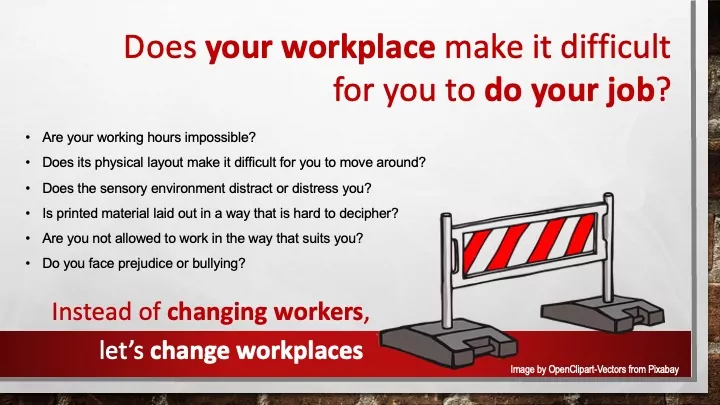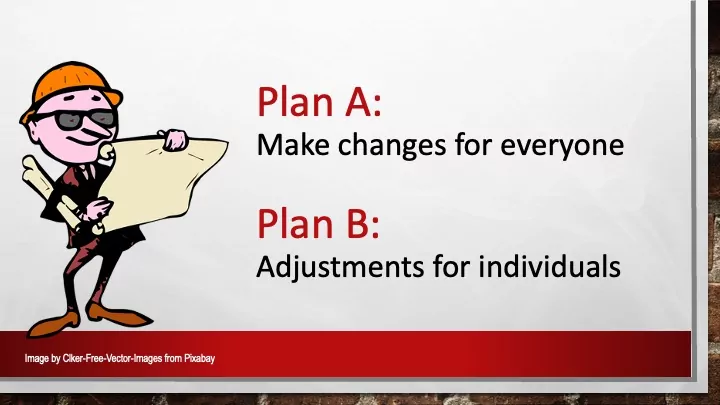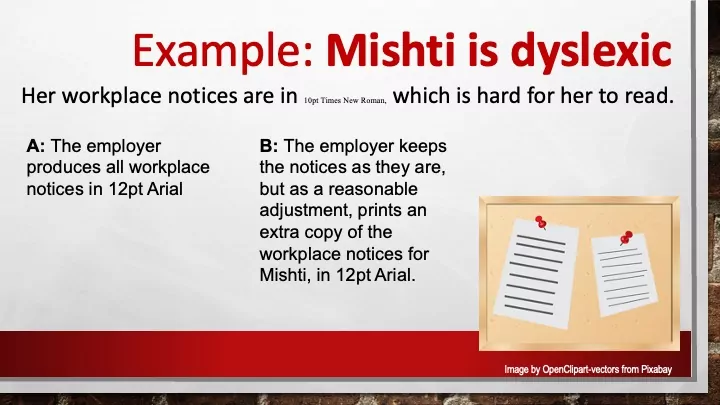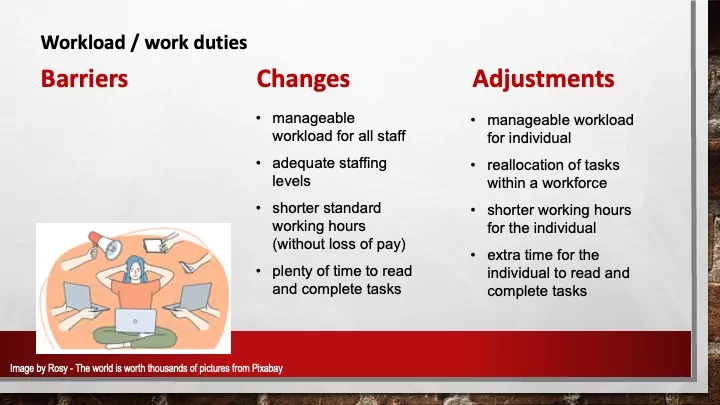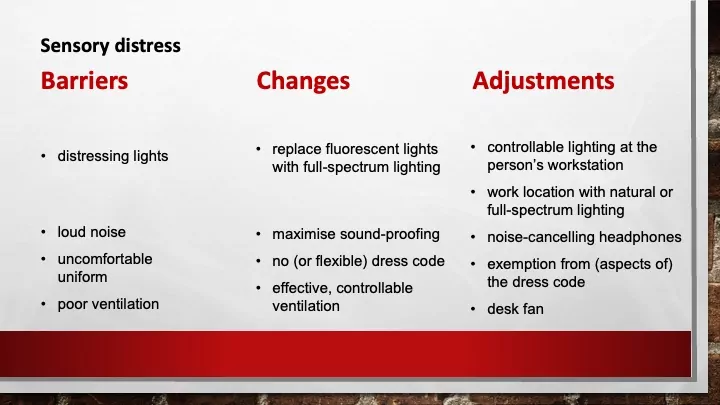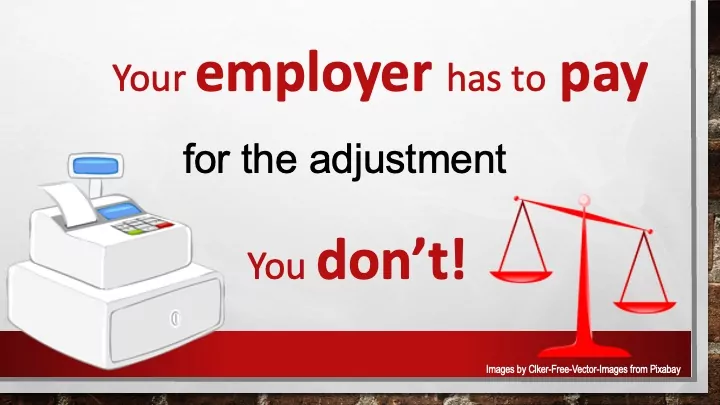Workplace changes and reasonable adjustments: Webinar 2
On Sunday (21 January), Red in the Spectrum held the second in of our series of ten Sunday evening Neurodiversity at Work webinars, on the subject of ‘Workplace changes and reasonable adjustments’.
Over thirty people attended, from a variety of jobs and work locations, and contributed their experience by speaking, posting in the chat, and through Slido.
This post contains the information given in the webinar presentation and some of the contributions from participants.
Does your workplace make it difficult for you to do your job?
- Are your working hours impossible?
- Does its physical layout make it difficult for you to move around?
- Does the sensory environment distract or distress you?
- Is printed material laid out in a way that is hard to decipher?
- Are you not allowed to work in the way that suits you?
- Do you face prejudice or bullying?
Instead of changing workers, let’s change workplaces.
How does your workplace make it difficult for you to do your job?
Participants’ responses:
Not providing a laptop.
Offering manager’s office as my quiet place (30mins away, when I’ve got 2hrs available to work).
Telling me I can’t have ‘more’ than everyone else – I must have the same as them for equality.
Not allowing transcripts of meetings because of “confidentiality” (despite me using transcripts only for my own note-taking).
Ignoring experts (by both experience and qualifications) in favour of some dodgy AI-written blog on an HR website.
Feeling pressured to have video on in meetings.
Getting negative feedback on my communication.
Refusing to provide instructions / processes for work tasks because ‘it’s too complicated to write down’ (while assuming that it’s not too difficult to memorise!)
Lack of predictability.
Being physically in the office, with a team who I feel excluded from, so I’m always on edge and assessing body language.
The crew/ mess/ break rooms are mostly busy, crowded, loud, uncomfortable. For a workplace of over 500 people, the one quiet room fits 3 people.
Not sticking to timings in agendas – I find the change of plan stressful.
Too much information in too many places. I lose track.
Won’t make sensory environment changes for me – excuse: there aren’t the numbers so it’s not worth the expense.
Keep wanting me to go to Occupational Health so they can say what I need!
Not everything being in writing. I struggle to remember verbally.
Sharing lots of important information verbally in meetings, but not recording it in writing to refer to when I struggle with memory issues.
Doesn’t appreciate invisible stressors for autistic people.
Being assigned work in a piecemeal fashion, which makes it very difficult to plan for the future.
I’m expected to anticipate when I’m about to hit a slack period.
Not taking into account the fact I wear a face mask, and organising networking and in-work-time social events surrounding food.
Not planning work and being efficient.
Shift work, switching from very early shifts to very late shifts. We can swap amongst ourselves but the rostering system is complicated and I often make mistakes.
My employers have been awkward and discriminatory since they found out about my diagnosis. I think they can’t get their heads around the real struggles people with neurospicy brains suffer through and believe I’m just asking for special treatment.
I got demoted because of symptoms that. My employer Googled but have never seen me struggle with in my job! I’ve been in my job for 5 years with no issues, only now they are making my life difficult because of symptoms they think I might have and they don’t understand reasonable adjustments.
Colleagues getting upset because I am blunt especially when stressed.
Expecting me to know what adjustments I need in a new environment.
Expecting me to work thinking the same way as a neurotypical does.
Unclear expectations and time to process the information to execute tasks.
Lack of acceptance that I have a different way of working and that my strengths include needing to do things thoroughly.
Not giving out formats for reports in enough time for me to work on them – often leading to me doing extra work if I’ve started work ahead of time and the format is not as expected when it is provided.
Unclear performance metrics.
Open office and fragmented team dynamics.
Asking for adjustments declined as I was on my probation period (subscription software).
Lack of communication of updates relating to what work is coming in/who is doing it.
Unclear role requirements and expectations.
My employer pays me for 20 hours and makes me work for 35 because ‘we’re all in the same boat’.
There are so many ad-hoc meetings that I struggle to keep up with the admin side of the job.
Inaccurate reports from occupational health.
I find lights an issue. Due to hybrid working, I am only in office one day a week and we hot desk, so they are not willing to make changes. Sometimes I wear sunglasses but this can be embarrassing.
Hotdesking is horrendous.
Blanket bans on things and blanket rules can affect NDs disproportionately.
Applying the social model to identify changes
Two ways of understanding disability
- The traditional, medical model sees your impairment or condition as the problem.
- The social model sees that you have a condition or impairment, and that society disables you by placing barriers in your way.
The social model approach: identify barriers -> remove barriers.
- Plan A: Make changes for everyone
- Plan B: Adjustments for individuals
Example: Mishti is dyslexic. Her workplace notices are in 10pt Times New Roman, which is hard for her to read.
- A: The employer produces all workplace notices in 12pt Arial
- B: The employer keeps the notices as they are, but as a reasonable adjustment, prints an extra copy of the workplace notices for Mishti, in 12pt Arial.
Barriers: workload / work duties
Changes:
- manageable workload for all staff
- adequate staffing levels
- shorter standard working hours (without loss of pay)
- plenty of time to read and complete tasks
Reasonable adjustments:
- manageable workload for individual
- reallocation of tasks within a workforce
- shorter working hours for the individual
- extra time for the individual to read and complete tasks
Barriers: Sensory distress
Distressing lights:
- Changes: replace fluorescent lights with full-spectrum lighting
- Reasonable adjustments: controllable lighting at the person’s workstation; work location with natural or full-spec truml ighting
Loud noise:
- Changes: maximise sound-proofing
- Reasonable adjustments: noise-cancelling headphones
Uncomfortable uniform:
- Changes: no (or flexible) dress code
- Reasonable adjustments: exemption from (aspects of) the dress code
Poor ventilation:
- Changes: effective, controllable ventilation
- Reasonable adjustments: desk fan
What measures would make your workplace more neuro-inclusive?
Some contributions from participants:
Quiet areas
Allowing more flexible work times
Not enforcing uncomfortable uniform
Better written communication
Clear, unambiguous language.
Assigning an equality manager
Mandatory neurodiversity training for managers (not using the excuse “oh, I don’t manage anyone like that yet”)
Cameras off in meetings if wanted.
Not having office radios.
Structured breaks beyond lunch.
Reasonable adjustments previously in place not being disallowed due to change of line manager or because too expensive.
Comfortable chairs for meetings.
Being able to turn off the motion-sensitive, horrifically bright lights.
Screens on desks.
Meaningful understanding.
Somewhere that isn’t a torture chamber of sound and light for a break.
Not having to jump through hoops and ‘go around the houses’ in trying to get needs met.
Send out notes for meeting summary afterwards rather than individual staff members having to write their own.
Flexible shifts.
Lighting changes.
Info in advance.
A real staff focus group, not one managed by HR who have no knowledge of disability.
Shorter / fewer meetings.
Shorter working hours.
Closed captions for hybrid meetings.
Individual offices.
Working from home is the main one for me – being able to control my environment. Fewer distractions, fewer migraines.
Not sharing a desk and sitting so close to someone as at school
Quiet spaces for staff
Giving an appropriate space to my assistance dog
I asked to have my meeting by email – they were confused how that would work, but said I can let them know what I want, then they’ll have a meeting, and give me summary notes (other options were they would record it, then send it to me).
I requested my partner (who is also a colleague) as well as a trade union rep to come into meetings as a reasonable adjustment. My trade union rep is there for work support and my other half is there for personal support.
Campaigning for a change
Campaigning together
- talk with workmates.
- identify a measure that you want your employer to implement.
There is power in a union.
- join a trade union.
- discuss neurodiversity at a union meeting.
- the union can raise your demand in the collective bargaining procedure.
Campaigning
- petition
- protest
- allies
- public support
- industrial action
Reasonable adjustments at work: What does the law say?
Your employer must make reasonable adjustments for you if you are disabled and you are at a substantial disadvantage compared to people who are not disabled due to:
- a rule, practice or other working arrangement (a ‘provision, criterion or practice’)
- a physical feature of your workplace
- not having extra equipment or help (an ‘auxiliary aid’)
Are you disabled?
- Neurodivergent people are not automatically considered disabled.
- Disabled: you have a physical or a mental impairment which has a substantial and long-term negative impact on your ability to do normal day-to-day activities.
- A formal diagnosis is not decisive.
The duty to make reasonable adjustments is a positive and proactive duty.
- When it arises, your employer must take steps to remove, reduce or prevent the obstacles you face.
- Your employer only has to make reasonable adjustments if they know or could reasonably be expected to know you’re disabled and are disadvantaged because of it.
Reasonable adjustments can be:
- changes to application processes
- changes to policies
- changes to working practices
- changes to physical layouts
- providing extra equipment
- providing extra support
Whether an adjustment is reasonable depends on:
- how effective the change will be in avoiding the disadvantage you face
- its practicality
- the cost
- your employer’s resources and size
- the availability of financial support
Your employer has to pay for reasonable adjustments – You don’t!
If you are an agency or contract worker
If you’re employed by one company but carry out your work for another – both companies might need to make adjustments for you.
You may complain to an employment tribunal if:
- a prospective employer doesn’t make reasonable adjustments to the application process
- your employer doesn’t make reasonable adjustments for you
- your former employer could have made reasonable adjustments to help you stay in the job but did not.
Asking for adjustments
Get ready …
- Talk with your trade union representative or other ally. With their help:
- Work out what adjustments you need.
- Plan how to ask for these adjustments.
- Prepare to explain to your employer:
- that you are disabled
- how you are disadvantaged
- that the adjustment you want is ‘reasonable’
… and ask!
- Ask the employer to respond within a certain time – 7 to 14 days?
- Keep all correspondence.
- If the employer asks to meet you, take your trade union representative or other companion.
- Keep notes of any meetings or conversations, and send an email confirming what was said.
- Follow up if the employer misses the deadline.
Reasonable adjustment passports
- Do workers have to start again asking for reasonable adjustments every time they change job / location / manager?
- Reasonable adjustment passports enable workers to keep their reasonable adjustments when they move job or location, get promoted, get a new manager etc
- More information from the Trades Union Congress.
Reasonable adjustments: Having difficulties
Participants also shared difficulties they had experienced in getting reasonable adjustments, including:
My colleague often wore over-the-ear headphones in the lab. The first day I wore in-ear headphones, the manager banned all headphones.
I use a tablecloth, noise-cancelling headphones, a hat and sunglasses. Apparently, that makes me unprofessional.
I wanted to have something like Grammarly to help me write reports, but that request has been stuck for months with IT security due to confidentiality issues.
I asked for Glean, as soon as I started, but HR said no, as I’m in my probation period (it’s a monthly subscription). It’s been seven months now.
I’m trying to convince my lot that ‘reasonable adjustments’ are actually ‘productivity enhancers’ but they won’t have it.
I’ve got my assessment this week – it’s been ‘provisionally’ accepted, it’s just I have to go through my boss to get signed up, and she’s not good at doing things quickly.
My workplace’s performance management portal has a space to include details of disabilities in the employee profile, but you have to choose from a pull-down menu in which “learning disability” is the closest match to autism.
I had a work place that wouldn’t give adjustments until I had an official dyslexia diagnosis – the upshot was they paid for a diagnosis.
I’ve had my ask for questions ahead of time refused. Cant they do this? They said ‘I’ve not head of this before, so no’ – even though I sent links to places explaining it.
I was told by a job coach that asking for interview questions in advance was illegal!
When cost is an issue, then surely the recommendation should be to go to Access to Work for the additional support needed on top of what work has already got you.
Lots of “Can’t make reasonable adjustment without diagnosis” mantras.
I had to carry a computer screen in on the bus for six months because it took that long for my workplace to sign the form for one for me.
I had to have an actual tantrum over the interview question thing in one workplace. They tried it. Turned out it was better for everyone if the questions went out in advance!
My reasonable and their reasonable are very different!
I’d like my work to be easier for me now I’ve embraced my dyslexia, but I find it hard to fight for it by saying I’m not doing my job well because I’ve always fought to do well despite it … Hope you get what I mean!
I asked for a larger screen laptop – we were a new team and they bought a job lot of 14″ notebooks – I told them about my dyslexia and tracking issues at interview, I mentioned it and I was told by my new manager that I would have to get on with it as we were all having the same.
The Equality Act does not give a time limit for reasonable adjustments. I asked for reasonable adjustments over a year ago and am still waiting.
Current workplace is trying to a request for reduced hours due to disability through flexible working rather than reasonable adjustments.
I am about to request a change to my hours, as I cannot do 12-hour shifts on the advice of my GP and consultant. However, my manager is I think going to refuse as if I work half a day they need another nurse to cover the rest of the shift. They will say it is not viable and not good for the business.
My experience is that managers are very poorly trained, if at all. And seem to forget from one month to the next to actively apply and stick to your agreed adjustments.
I stick a bullet point on the end of my list that says something like ‘The employer must recognise that my needs are variable and further adjustments may need to be considered’.
Resources
These were recommended by participants at the webinar. Posting them here for information does not mean that Red in the Spectrum endorses them. Red in the Spectrum strongly recommends that you contact your trade union for assistance in campaigning for the changes and/or asking for the reasonable adjustments that you need.
- https://valla.uk/guides
- Equality Advisory Support Service (EASS) https://www.equalityadvisoryservice.com/ has letter templates for requesting reasonable adjustments.
- Dr Christian Mallon shared some documents that he had put together suggesting adjustments. One is attached: 600 list of reasonable adjustments for neurodiverse employees already in their jobs
Reasonable adjustments: Some relevant Tribunal cases
There are eight more webinars in the series – you can attend whichever ones are most interesting and relevant to you.
Whether you attended this week or not, we hope to see you at some point over the next eight weeks.
Next week, we will be discussing To Tell or Not to Tell [your boss that you are neurodivergent]? Register here.

